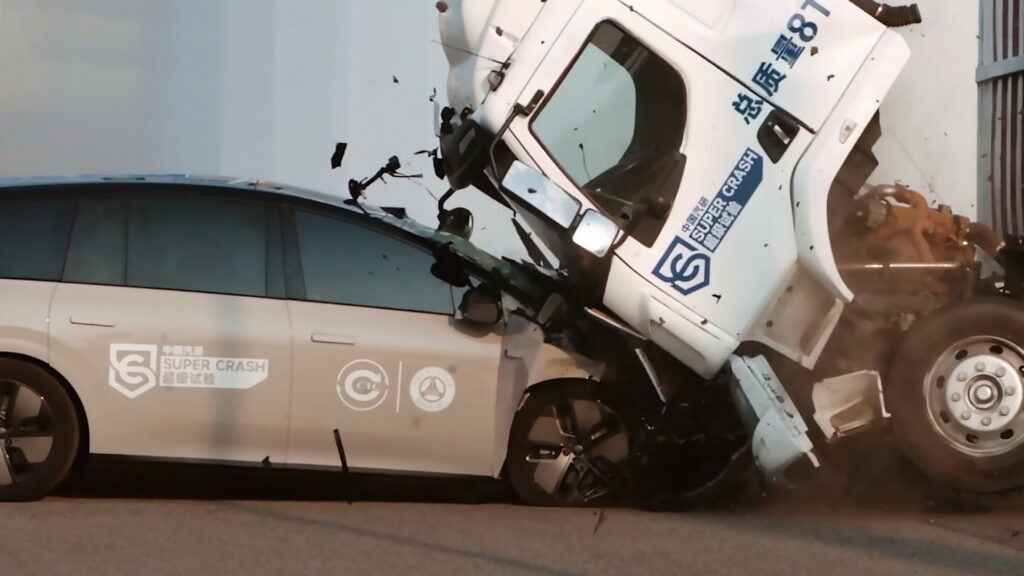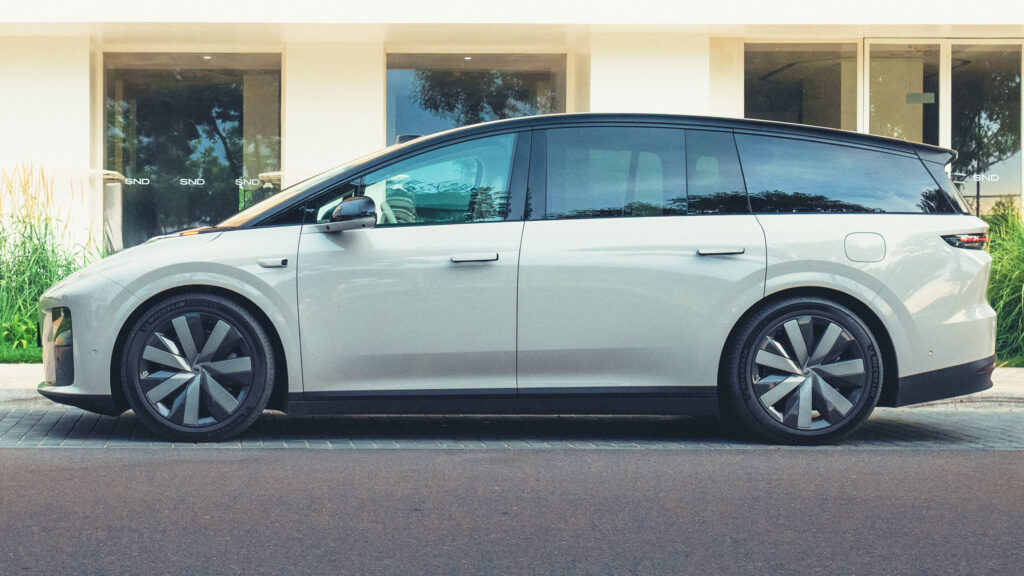Chinese EV Crash Test Sends Truck Flying And A Brand On Defense

- Li Auto’s SUV crash test video triggered backlash from Dongfeng Liuzhou Motor this week.
- The electric SUV collided head-on with an 8-ton truck in a dramatic video demonstration.
- Dongfeng Liuzhou accused Li Auto of misleading tactics and questioned the video’s authenticity.
As electric vehicles gain traction around the world, Chinese automakers are pushing harder than ever to stand out – and not just with their designs and tech, but also by trying to prove their safety credentials in dramatic fashion.
One recent example comes from Li Auto, which introduced the i8, a three-row electric SUV packed with promising specs. Yet it wasn’t the vehicle’s feature list that stole the spotlight during its unveiling. It was a video of the i8 crashing head-on into a heavy truck.
More: See What Happens When Two Cars Hit A Chinese EV At 60KM/H In Triple Crash Test
The footage showed a direct collision between the Li Auto and a Chenglong truck. The electric SUV, weighing between 2,580 and 2,610 kg (5,690–5,750 pounds), hit the truck at a speed of 60 km/h (37 mph). The truck, with a significantly greater mass of 8 tons (16,000 pounds), was traveling at 40 km/h (25 mph) at the time of impact.
A Closer Look at the Collision
Despite the imbalance in weight and size, the i8’s structural integrity held up well. . The short front overhang absorbed much of the force, and the pillars remained intact with no visible deformation. In the aftermath, the doors automatically unlocked and the handles extended outward, allowing testers to easily access the interior.
Furthermore, all nine airbags deployed, and the emergency call system was activated. Impressively, the floor-mounted battery pack didn’t produce any fire or smoke, even after sustaining deep scratches from a metal pole prior to impact.
Truck Frame Behavior Raises Questions
What caught many viewers off guard was the impact on the much larger truck. The force of the collision caused its cabin to tilt dramatically forward, nearly detaching from the chassis, with all wheels momentarily lifting off the ground. That unexpected outcome prompted a swift response from Dongfeng Liuzhou Motor, parent company of the Chenglong brand. On August 1, the company issued a public statement expressing concern about the test.
According to a report by QQ News, Dongfeng Liuzhou Motor accused Li Auto of “serious infringement.” The company questioned the credibility of the video, claiming it painted a misleading picture and did not reflect real-world driving conditions. Internal analysis, they said, showed that the test setup differed significantly from what would typically occur on the road.
Li Auto
Li Auto Defends Itself
Li Auto responded on August 3rd through an official Weibo post, stating that the crash test was conducted by China Automotive Engineering Research Institute (CAERI), a third-party state-owned company.
The automaker clarified that the video “was not intended to evaluate the product quality of any other brand, and the test results should not be interpreted as indicative of the quality of other brands’ products”.
Instead, they said the truck used in the test was purchased in the secondhand market and served only as a “mobile barrier.” The company noted, “It was unintentional that the testing process caused the Dongfeng Chenglong brand to be embroiled in public controversy.”
More: CATL’s New EV Chassis Can Withstand 75 MPH Impact Without Catching Fire Or Exploding
In a follow-up, Li Auto added, “As a benchmark brand in China’s trucking industry, Dongfeng Chenglong’s quality and safety have always been trusted by truck drivers. To this end, we would like to clarify that there is no direct competition between Li Auto and Dongfeng Liuzhou Motor.”
Independent Testing Body Confirms Details
The China Automotive Engineering Research Institute has confirmed Li Auto’s claims in a separate statement. They described the crash test as a “non-standard vehicle-to-vehicle collision test” that simulated a traffic accident scenario, adding that it “does not involve the safety performance evaluation of other brands of vehicles”.
The institute further explained that the only criteria used when selecting the truck was its curb weight. No performance modifications were made beyond repainting it from red to white, adding autonomous driving gear, and loading it to reach the 8-ton target weight.
Do you think Li Auto’s crash test was a genuine show of EV strength or a carefully staged stunt at a rival’s expense? Share your take in the comments below.
